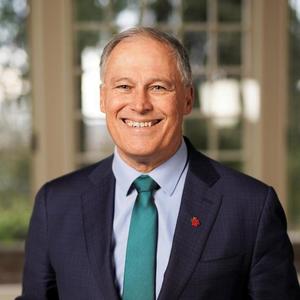Inslee signs bill to implement CFS in Washington

May 17, 2021
BY Erin Krueger
Washington Gov. Jay Inslee on May 17 signed legislation that will create a state-wide Clean Fuel Standard that will limit the aggregate, overall greenhouse gas (GHG) emissions per unit of transportation fuel energy to 20 percent below 2017 levels by 2035.
The requirement phases in with up to a 0.5 percent reduction for each year in 2023 and 2024, no more than an additional 1 percent each year beginning in 2025 through 2027, no more than an additional 1.5 percent each year beginning in 2028 through 2031, and no change in 2032 and 2033.
Advertisement
The legislation, HB 1091, was introduced in January. The Washington House of Representatives on Feb. 27 voted 52 to 46 to pass the bill. The Washington Senate on April 8 voted 27 to 20 in favor of an amended version of the bill. The House refused to concur to the Senate’s version of the amended bill on April 20. A conference committee was later convened. The Senate approved the conference committee report by a vote of 26 to 23 on April 25. The House voted 54 to 43 to adopt the conference committee report later that day. The legislation was delivered to the governor on April 26.
Inslee signed HB 1091 and two other pieces of climate legislation during an event held at Shoreline Community College. “This is a jobs package to solve climate change, and we ought to talk about it as a jobs package,” he said. “We’re going to put people to work with these bills. That’s what we’re doing.”
“Today we join the West Coast of the United States and British Columbia in adopting a clean fuels standard,” Inslee continued. “We know that cleaner fuels give us cleaner air to breathe. We know that transportation is our largest single sector of air pollution, so cleaning up our fuels is the best thing that we can do for the breathing of our children…The clean fuels standard is an anti-asthma bill. Our children deserve to breathe, and our people deserve cleaner fuels at a reasonable price."
Advertisement
Inslee cautioned the public from believing the “swill” that the CFS will increase fuel prices, noting that similar programs in California, Oregon and British Columbia demonstrate that is not the case. He also noted the CFS will provide those in Washington will more fuel choices while providing a market for locally produced fuels and reducing the need for foreign oil.
Additional information on the Washington CFS is available on the Clean Fuel Washington website.
Related Stories
CountryMark on July 22 celebrated the completion of more than $100 million in upgrades at its refinery in Indiana, including those related to soybean oil storage. The facility produces renewable diesel via coprocessing technology.
ATOBA Energy and Air Moana are partnering to implement scalable solutions for the supply of SAF. The collaboration aims to ensure long-term SAF availability while supporting local initiatives to develop sustainable fuel production in Tahiti.
While final IRS guidance is still pending, the foundation of the 45Z program is well defined. Clean fuel producers should no longer be waiting; they can now move forward with critical planning and preparation, according to EcoEngineers.
Neste Corp. on July 24 released second quarter results, reporting record quarterly renewable product sales volumes despite weaker margins. SAF sales were up nearly 80% when compared to the first quarter of 2025.
Valero Energy Corp. on July 24 released second quarter results, reporting a profitable three-month period for its ethanol segment. The renewable diesel segment posted a loss, but the company’s new sustainable aviation fuel (SAF) unit operated well.
Upcoming Events










